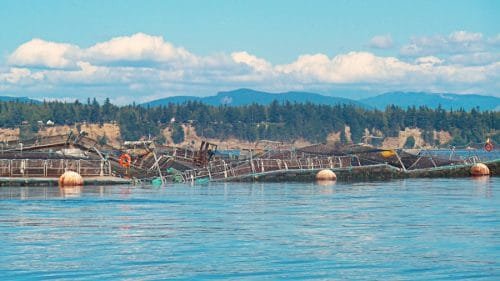 Collapsed net pens at Cypress Island. Photo courtesy: Washington State Department of Natural Resources
Collapsed net pens at Cypress Island. Photo courtesy: Washington State Department of Natural Resources
Following a massive net pen collapse at Cypress Island and escape of 160,000 farmed Atlantic salmon in August 2016, public attention turned to the safety of salmon farming and its possible impact on native species. According to the Department of Natural Resources, the future of commercial Atlantic salmon farming in Puget Sound is now in doubt.
Cooke Aquaculture, a Canadian company that purchased its operations from Icicle Seafoods in 2016, operates all eight net pens in four locations in Puget Sound.
“My duty to the people of Washington is to protect our state lands and waters, while also generating revenue for schools, essential services and restoration of natural areas like Puget Sound,” stated Washington State Commissioner of Public Lands Hilary Franz. “After the collapse of Cooke’s Cypress Island net pen in August, which released 160,000 nonnative salmon into our waters, I directed my staff to inspect every net pen site in the state to ensure that Cooke was meeting its contractual obligations and that our waters are safe.”
Review of the Port Angeles operation revealed multiple violations, and the lease was terminated in December.
A news release from the DNR stated “Given Cooke’s failure to comply with the terms of the lease, DNR has clear authority to terminate the agreement. DNR will work with Cooke to wind up its operations at the site.” “Given the size of the Port Angeles operation and the amount of biological material, the priority is that this be done properly and safely,” stated Carlo Davis, communications director for DNR.
Cooke filed a lawsuit in Clallam County Superior Court against the DNR Jan. 5. According to a report in Seafood News, the company said that the attempt to terminate its lease is “not supported by the facts and will unnecessarily result in the loss of scarce rural jobs.”
The investigation of the salmon spill on Cypress Island is ongoing, but Davis said that some escaped Atlantic salmon had survived longer than expected. When asked how likely it was that new permits would be awarded, Davis said, “Commissioner Franz is skeptical of the future of this industry in our waters.”
Two bills concerning commercial salmon farming have been introduced in the state Legislature. SB 6086 would gradually phase out industry permits as they expire; the state would no longer authorize new leases or allow any agency to issue permits for any activity involving invasive species of marine finfish aquaculture. HB 2418 would delay construction of new nonnative finfish aquaculture facilities until thorough study, including structural analysis of existing facilities, is completed.
The most recent recommendations from the state regarding commercial salmon farms date back more than 20 years. In the spring of 2016, the Department of Ecology took the lead in a project to update those recommendations in Puget Sound, Willapa Bay and Grays Harbor. Staff members of the Port Gamble S’Klallam Tribe and Northwest Indian Fisheries Commission are advising the effort. A final report is due in the fall of 2019.
Curt Hart, communications manager for Ecology, said impetus for the project came from local governments that issue permits for aquaculture and need updated information for shoreline management programs. Pierce County prohibits net pens south and west of the Tacoma Narrows Bridge.
UNDERWRITTEN BY THE FUND FOR NONPROFIT NEWS (NEWSMATCH) AT THE MIAMI FOUNDATION, THE ANGEL GUILD, ADVERTISERS, DONORS AND PEOPLE WHO SUPPORT INDEPENDENT, NONPROFIT LOCAL NEWS